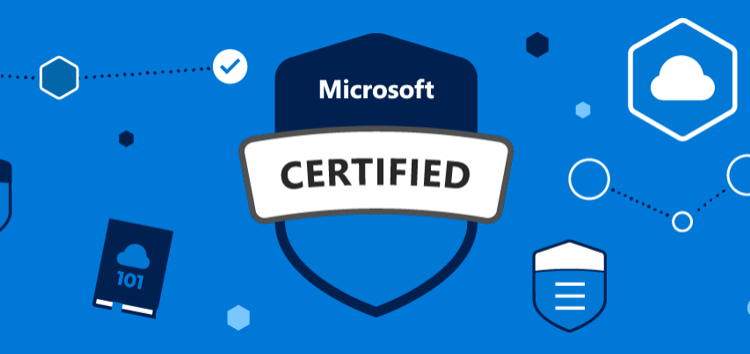Eight out of ten hiring managers of the IT sector consider certifications as an essential parameter for determining a candidate’s suitability for a job. Certifications are more like bonus points in your CV. They give you an edge over the other applicants for the position, as there is no on-the-spot competition in certifications, unlike additional rounds like interviews and tests.
One of the most sought-after certificates, a Microsoft certification easily stands out from the crowd. As per a survey by ZDNet, 35% of surveyed employees agreed that such credentials helped them reach the job profiles they currently hold.
Microsoft offers technical skills training through Microsoft online courses in Microsoft 365, Office 365, Windows 10, SharePoint, Dynamics 365, Exchange Server, Windows Server, System Centre, Visual Studio, SQL, .NET, Azure, among others.
Why Do Microsoft Certified Professional Courses Stand Out?
Microsoft is an industry leader in software and technology, leading the tech innovation revolution from the front line while training professionals in the field. Let’s look at what makes these Microsoft certification courses incredibly popular:
- Professionals with Microsoft certifications have increased productivity and efficiency, and they are more exposed to practical applications of the latest technologies.
- According to industry data, around 23% of Microsoft certified professionals receive a pay increment of up to 20%.
- On average, certified professionals earn at least 15% more than uncertified ones.
- Microsoft is a pioneer in the latest techs like Microsoft Artificial Intelligence, Big Data Analytics, Open-Source Technologies, Cloud Technologies, etc. The cybersecurity courses also train professionals to become network security experts.
Changes In Microsoft Certifications In 2019
Microsoft has been training professionals in advanced software technologies for decades. And since it aspires to stay updated as per the latest trends, it made a few changes in its Microsoft certification training program in 2019.
These changes have been explained below:
- Recognizing the need for role-based competencies, Microsoft introduced its all-new role-based certifications. Professionals and students will now be able to look for courses as per their current role or the role they seek.
- A few outdated MCSA and MCSE certifications have been removed from the training modules. However, certain ones which focus on some specific widely used products are still available.
- Some assessments have also been retired, and new exams for the same courses have been put in their place. The focus is on assessing the trainees on application compatibility besides theoretical knowledge.
Which Courses And Exams Retired In 2019?
Following courses are no longer the part of Microsoft certification training since 2019:
- MCSE: Cloud Platform and Infrastructure
- MCSA: Cloud Platform
- MCSA: Linux on Azure
- MCSA: Machine Learning
- MCSA: Data Engineering with Azure
- MCSA: Windows 10
- MCSA: Dynamics 365
- MCSE: Mobility
- MCSA: Office 365
Following assessments retired in 2019:
- 70–532: Developing Microsoft Azure Solutions
- 70–535: Architecting Microsoft Azure Solutions
- 70–533: Implementing Microsoft Azure Infrastructure Solutions
- 70–346: Managing Office 365 Identities and Requirements
- 70–347: Enabling Office 365 Services
- 70–695: Deploying Windows Desktops and Enterprise Applications
- 70–697: Configuring Windows Devices
- 70–698: Installing and Configuring Windows 10
- AZ-100: Microsoft Azure Infrastructure and Deployment
- AZ-101: Microsoft Azure Integration and Security
Features Of New Role-Based Microsoft Certifications
- You get validation for your newly learned skills with proper know-how regarding the application areas, i.e., if you are a cloud engineer, the cybersecurity courses will enhance your skillset in the Cloud Security domain.
- Technical roles are ever-evolving, and the courses let you keep pace with the role competencies.
- An upskill path for career development opens doors to new opportunities.
- It helps you become what companies are looking for, with relevant skills for current and future projects.
- The new Microsoft certifications will prepare you for various IT roles such as Data Engineer, Security Engineer, System Administrator, Solutions Architect, DevOps Engineer, Developer, AI Engineer, Administrator, Cloud Computing Expert, etc.
Conclusion
Certifications ensure the hiring teams of your personality and strengths in a particular field. They equip you with all the necessary tips and tricks handy while working on a real-life project. Also, these certificates are essential for learning further advanced skills as every certification serves as the foundation of the next one.
If you are looking forward to expanding your area of expertise for availing of the best job offers, you must enroll in a Microsoft certification course at Koenig Solutions.
Tags: microsoft certification

